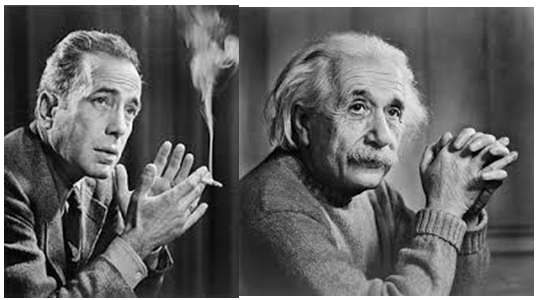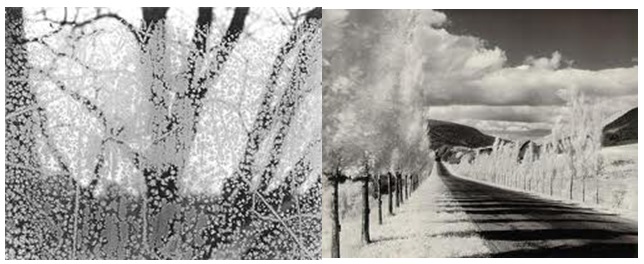Bill Brandt
Bill Brandt (1904-1983) is one of the most famous British photographers who is prominent because of his modernist approach to presenting real objects, figures, and landscapes while balancing on the fringe of strangeness and naturalism. Brandt took photographs following the traditions of photojournalism but focusing on the imaginative vision of reality. Brandt’s photographs reflect the controversies of the British and European society in the twentieth century with the help of concentrating on the most provocative aspects and details.
However, Brandt’s photographs cannot be discussed as belonging to a definite historical period. The pictures are modernist, and they attract the audience’s attention in spite of a certain background. Brandt operated the play of contrasts and focused on challenging controversies while showing nudes or natural objects (Delany 2004). The presented pictures provide examples of the photographer’s exciting ability to combine natural objects, landscapes, and human bodies in a strange and provocative manner.

Yousuf Karsh
Yousuf Karsh (1908-2002) is a prominent Armenian-Canadian photographer who specialized in taking portraits. Today, the most popular Karsh’s works are the portraits of famous people. Karsh’s works differ from the other photographers’ works in professionalism and work with lights. Karsh is discussed as the master of the studio lights because he considered the effective light as the method to present the person from the best side. The particular features of personality are accentuated with the help of body positions, perspectives, and studio lights. It was important for the photographer to try to represent the inner world of the person. Thus, Karsh’s works are characterized by the concentration on the figure of a person, on the facial expression, and on contrasts to emphasize the definite aspects which are contributing to understanding the picture and to hide the other ones (Yousuf Karsh 2008).
As a result, Karsh’s draw the audience’s attention because the pictures are aesthetically perfect and interesting. On the one hand, famous figures presenting in pictures are photographed as the stars. On the other hand, they can be perceived as the people who are real and close, and the viewer’s task is to observe the person’s soul depicted by the photographer.

Minor White
Minor White (1908-1976) is a famous American photographer who combined his interest in the natural world and botany with an interest in photography providing a range of impressive pictures on which the beauty of nature is depicted. White is famous for his concentration on details and minor objects which usually do not attract the attention of the public. Nevertheless, the professionalism of White is great, and any object depicted by the photographer can be discussed as a piece of art.
In his works, White supports the idea of photography as art clearly. Thus, any objects photographed by White resemble illustrations in the books and impress the public with their fairy-tale nature. The series of pictures with frost on the window photographed by White can be considered as one of the most impressive author’s works in which usual objects and processes are depicted as meaningful art objects. White’s pictures are emotional and symbolic in their nature, and they are made to evoke the audience’s emotions (Rauch 1989). Focusing on certain objects, viewers can recognize symbols and interpret the meaning of the picture hidden by White in simple objects, but the complex presentation.

Reflection on the Course
The course in photography is a great opportunity to develop and improve skills in such a field of art as photography. I am inclined to discuss photography as an art that is based on practice, experience, knowledge, artistic vision, and imagination. The course in photography is important to find balance while paying attention to all these aspects in order to become a real photographer. I am interested in photography because it is a good way to demonstrate my unique vision of the world, its objects, and processes. People eagerly react to visual images, and photography is the best way to combine my imagination, perception of reality, and real objects. From this point, I share the ideals of Bill Brandt as a photojournalist, but the approach used by Minor White is more close to me. Developing my skills in photography, I intend to take pictures which are emotionally vivid and present definite meaning which can be recognized by the public.
I discuss photography not only as the method to document pleasant moments important for me and my family. My goal is to use a camera as a tool because photography is art. Photography is the modern variant of painting which provides its opportunities to represent reality from the photographer’s unique point of view. My first steps in photography can become albums for relatives with imaginative pictures. Today, I only start choosing the direction in photography that is why I often refer to the experience of professionals which inspires me.
Quotes and Explanations
- According to Helmut Newton, “the first 10 000 shots are the worst”. The photographer focuses on the fact that to become mature and develop professionalism, a photographer should present more than 10 000 shots and the progress in the art of photography is possible only after this intensive practice.
- Ani Garrick states, “Movement and playing with perception are continual threads in my imagery as I question what is real in space and time”. This quote can be explained with references to the complex process of taking a photograph. Thus, the process of photographing as well as the choice of objects is based on the work of the photographer’s imagery and perception of reality. To take a great photograph, it is necessary to play with the perception of reality and refer to imagery.
- Roger Kingston states that “a camera is a ‘save’ button for the mind’s eye”. This quote can be discussed as the practical definition of photography and its functions within society. According to Kingston, photography is the process of fixing and saving moments which are important for the photographer, for his “mind’s eye”.
- Ken Rockwell focuses on the idea that “photography is the power of observation, not the application of technology”. This quote supports the opinion that photography depends on the person’s ability to see and observe reality, and the effective usage of different technologies to make beautiful and interesting photographs is the secondary task.
- Simon Watney pays attention to the fact that “no picture has a single meaning”. These words mean that it is impossible to discuss a photograph only from one perspective.
- According to Fred Picker, “a photographer’s reality is what he or she wants to show”. From this point, taking a picture, a photographer presents the world as he or she sees it, shows his or her personal reality (PhotoQuotes 2010).
Reference List
Delany, P 2004, Bill Brandt: A life, Stanford University Press, USA.
PhotoQuotes. 2010. Web.
Rauch, J 1989, Minor White: The eye that shapes, Art Museum, Princeton University, USA.
Yousuf Karsh 2008. Web.